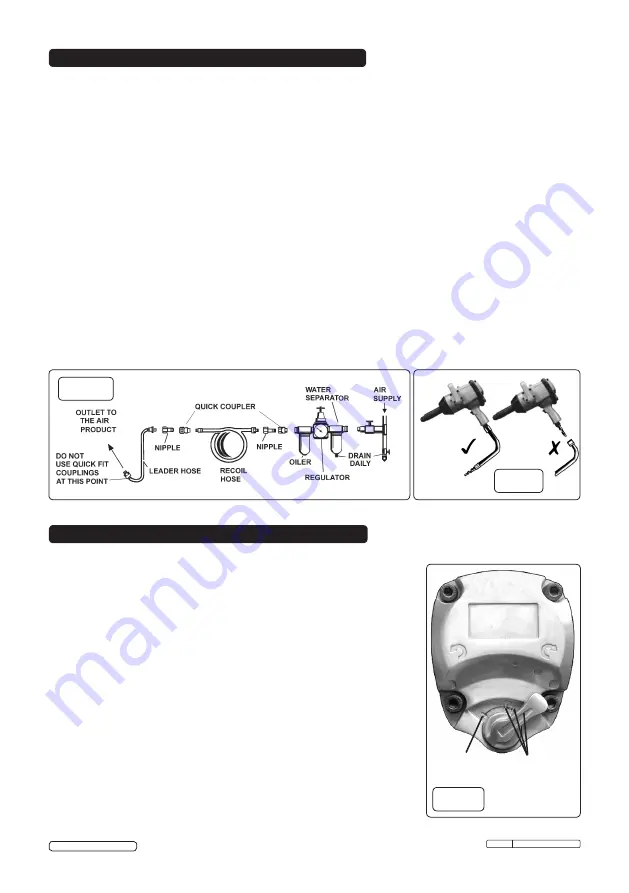
For recommended hook-up, procedure is shown in figs 1 & 2
.
3.1. Air Supply.
3.1.1. Ensure wrench air valve (or trigger) is in the "off" position before connecting to the air
supply.
3.1.2. You will require an air pressure of 90psi and an air flow according to specification.
3.1.3.
WARNING!
Ensure the air supply is clean and does not exceed 90psi while operating the
wrench. Too high an air pressure and unclean air will shorten the product life due to
excessive wear and may be dangerous causing damage and/or personal injury.
3.1.4. Drain the compressor air tank daily. Water in the air line will damage the wrench.
3.1.5. Clean compressor air inlet filter weekly.
3.1.6. Line pressure should be increased to compensate for unusually long air hoses (over 8
metres). The minimum hose diameter should be 1/4” I.D. and fittings must have the same
inside dimensions.
3.1.7. Keep hose away from heat, oil and sharp edges. Check hose for wear and make certain
that all connections are secure.
3.2. Couplings.
Vibration may cause failure if a quick change coupling is connected directly to the wrench.
To overcome this, connect a leader hose to the wrench. A quick change coupling may then
be used to connect the leader hose to the air line recoil hose. See figs 1 & 2.
3.
PREPARING WRENCH FOR USE
4. OPERATING INSTRUCTIONS
WARNING! Ensure you read, understand and apply safety
instructions before use.
4.1.
Only use impact sockets which are specifically designed for
use with an impact wrench.
4.2.
Connect the wrench to the air hose as in Section 3.
4.3.
Place the socket over the subject nut and depress the trigger to
operate the wrench.
4.4.
To change drive direction turn the air regulator on the rear of
the body to the desired direction. (fig 3)
4.5.
The torque may be adjusted in the forward gear by adjusting
the torque control on the rear of the body, between 1 low power
and 3 full power.
4.6.
The SA297 incorporates two exhausts, one at the bottom
of the handle and one at the front above the trigger (fig.4). The
handle exhaust is adjustable allowing you to adjust the flow
through either the handle or front exhaust. When the handle
exhaust is fully open the speed of the wrench is increased,
when the handle exhaust is closed the wrench speed will
decrease and the air will be vented through the front exhaust.
fig.1
fig.2
fig.3
THREE
FORWARD
TORQUE
SETTINGS
REVERSE
Original Language Version
SA297 Issue:4(SP) 13/06/13
© Jack Sealey Limited






















